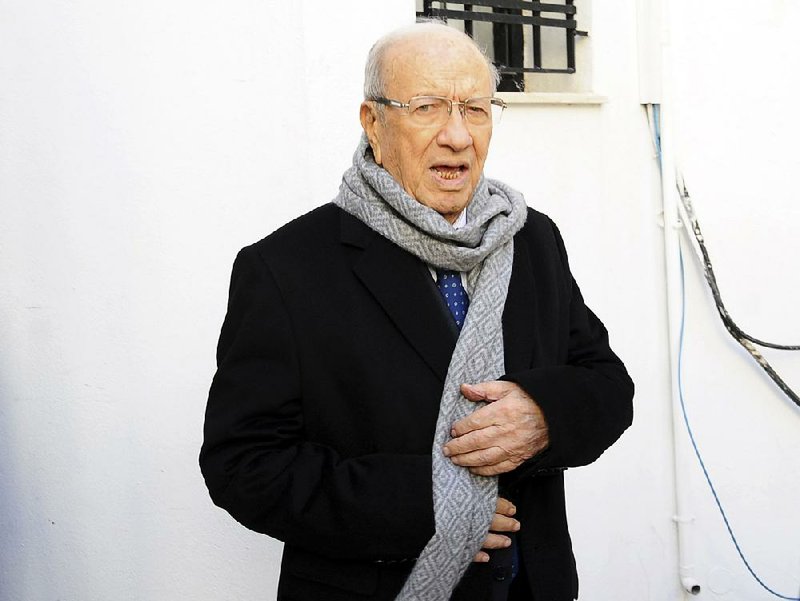TUNIS, Tunisia -- An 88-year-old political veteran has been elected president of Tunisia, a country whose young people once electrified the world by overthrowing its 73-year-old dictator in 2011 and triggering the Arab Spring uprisings across the region.
The election result is a measure of Tunisia's yearning for a return to stability: After four hard years of democratic transition, violence and economic crises, this onetime revolution of the youth has turned to a symbol of the old regime.
Beji Caid Essebsi won 55.68 percent of the vote according to Monday's results and campaigned on restoring the "prestige of the state," evoking the legacy of Tunisia's founding father, Habib Bourguiba, who built the country and educated its people but allowed little opposition.
Essebsi defeated the human-rights activist who became the interim president after the revolution, Moncef Marzouki, who took 44.32 percent of the vote.
The transition in Tunisia has remained on track, but it has been buffeted by the turmoil in the region, which brought down the Islamists who first won elections after the revolution.
As the economic problems mounted and radical extremists began assassinating politicians in 2013, the moderate Islamist Ennahda party and its ally Marzouki lost popularity.
"It's the failure of Marzouki that made Essebsi look like a statesman that would help Tunisians face and cope with these major challenges," said Kamel Labidi, a former journalist and a freedom-of-expression advocate, explaining the popularity of Essebsi and his party Nida Tunis.
He cautioned, though, that many in Nida Tunis, a loose collection of old regime officials and trade unionists, do not have a reputation for caring about human rights and that Essebsi himself never spoke out against the autocratic rule of Bourguiba or his successor Zine El Abdine Ben Ali.
The victory of Nida Tunis in parliamentary elections in October will give Essebsi unprecedented power to shape the country, as he will dominate both the executive and legislative branches.
Economist Ezzedine Saidane said that is a good thing in light of the economic challenges the country is facing, including high inflation, unemployment and public debt, with low foreign investment and a weak banking sector.
"The two executives [president and prime minister] working together in a harmonious manner will be extremely important for a successful transition to stable institutions and a healthy democracy," he said.
U.S. President Barack Obama congratulated Essebsi on his election and the country's transition to democracy in a statement issued by the embassy in Tunis.
"The strong commitment by Tunisia's leaders and the Tunisian people to inclusive political dialogue, consensus-building, and democratic values has been crucial to the success of the political transition and will be equally important during the next phase," he said.
Reconciliation may be an early priority for Essebsi. After claiming victory Sunday night, he reached out to Marzouki's supporters and called on them to work with him to rebuild the country.
Marzouki was backed by Tunisia's Islamists but also by large areas of the impoverished south.
In its report on the eve of elections, the International Crisis Group said the past few months have revealed the deep divisions in Tunisian society and cautioned that the next president must pursue conciliatory policies.
"Whoever wins the presidential election will have to work alongside the new government and parliament to calm both camps' anxieties, address their legitimate grievances and heal the country's divisions," the group said.
Essebsi's party was largely formed in opposition to the Ennahda party, and an actual coalition with the Islamists would be a hard sell among its members, but the door has been left open for some kind of informal cooperation.
Tunisia is under a great deal of pressure regionally as democratic experiments in neighboring countries have disintegrated into fighting or military rule. Nations in the region such as Saudi Arabia, United Arab Emirates and Egypt are also opposed to any political involvement of Islamist parties.
Voting was largely pronounced free and fair, with a participation rate of 60 percent, less than elections in October and November, and with lower participation among young people.
"Voter participation decreased with each successive election," said Scott Mastic of the International Republican Institute, which observed the elections and noted low youth participation. "The potential for growing disillusionment with the country's politics is a concern and something Tunisia's new leaders must be prepared to address."
Riots did occur Sunday night in the southern cities of Gabes and Tatouine where young people clashed with police and burned a Nida Tunis headquarters and two police stations.
A Section on 12/23/2014

